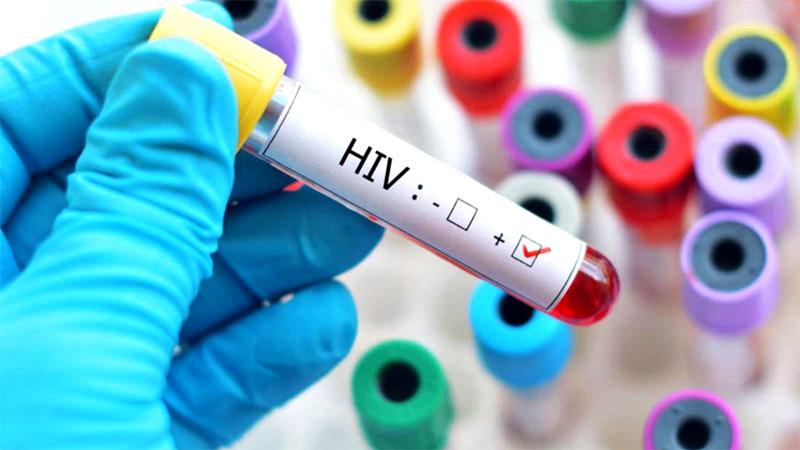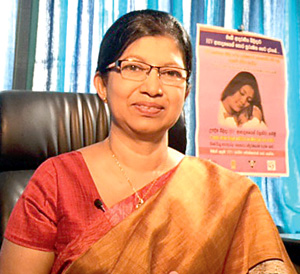
The recent opening of the country and relaxing health regulations that confined especially young persons from engaging in their normal social activities has raised fears that there could be an increase in the present low HIV prevalence rates due to young persons exposing themselves to unprotected sex. The Sunday Observer took these fears to the Deputy Director, Consultant Venerelogist and Co-ordinator HIV Care services EMTCT, HIV & Syphillis, of the National STD AIDS Control Program, Colombo Dr Lilani Rajapaksa who answered them using her hands on experience in the field , in an exclusive online interview with the paper.
Excerpts of the interview.
 Q. HIV/AIDS continues to remain a public health problem in many countries despite efforts by health authorities to halt its spread amid the Covid-19 pandemic. Firstly, briefly tell us what HIV is and how it is linked to AIDS?
Q. HIV/AIDS continues to remain a public health problem in many countries despite efforts by health authorities to halt its spread amid the Covid-19 pandemic. Firstly, briefly tell us what HIV is and how it is linked to AIDS?
A. HIV (Human Immunodeficiency virus) is the virus which causes AIDS. Unlike other viruses which show affinity to an organ of the body, HIV affects the immune system of the body. It lowers the immunity of the infected person gradually. This can take many years up to 10 years. A person infected with HIV does not experience any significant clinical problem during this period. However, when the immunity is very low the person starts experiencing illnesses due to infections and cancers. When the person is seriously ill the patient is identified as having AIDS.
Q. What is Sri Lanka’s prevalence rate of HIV/AIDs compared to other countries as per population?
A. Sri Lanka remains a country with low prevalence of HIV, 35 years after identifying the first Sri Lankan with HIV in 1987. This low prevalence of HIV is largely due to the implementation of suitable strategies by many stakeholders under the leadership of the National STD AIDS Control Programme. These stakeholders include health and non health sectors of the government as well as private sector, NGOs and several other organisations of key populations.
 Q. A study showed that there has been a slight increase in the number of people living with HIV in recent years. Is it something for health officials to worry about??
Q. A study showed that there has been a slight increase in the number of people living with HIV in recent years. Is it something for health officials to worry about??
A. Yes. The reported numbers of people living with HIV are increasing gradually and is a concern for health officials as when a person gets infected it is for life time and it can not be reversed.
Q. Who are those most at risk of getting HIV/AIDs infections in Sri Lanka?
A. There are four groups identified as most at risk of HIV infection in the country. This includes female sex workers, men having sex with men, drug users and ‘beach boys’. They are at risk as they have unprotected sex with many partners. They have a risk of getting infected and are capable of infecting others. According to the recently conducted survey among these groups more than 80% of sex workers and men having sex with men have used condoms during the last sex act. However, the number who always used condoms was less.
Q. What is the most common route/s of HIV transmission in Sri Lanka?
A. In Sri Lanka, almost all adults were infected through unprotected penetrative sex. Unprotected anal sex carries the highest risk of HIV transmission followed by unprotected vaginal sex. The risk of transmission through sharing of needles and syringes is high among injection drug users. Though injection drug use is reported as low in the country, a study among injection drug users in Colombo and suburbs reveal high risk of HIV transmission through sharing of needles and syringes.
Current practices of ear or body piercing and tattooing can cause HIV infection or hepatitis B if proper infection control measures are not practised.
Q. How is it NOT transmitted ?
A. HIV is transmitted only through close relationships with infected individuals by vaginal and seminal fluids or blood and other body fluids. There is no possibility of HIV transmission through normal social interactions such as, living with an infected person in the same premises, school or working place.
Q. Will wearing condoms while having sexual intercourse reduce or prevent getting infected?
A. Consistent and correct use of condoms reduces the risk of HIV.
Q. Many men who engage in same sex do not know how dangerous it is since it leads to a host of other diseases as well. What are the significant health impacts of engaging in such relationships?.
A. My experience has shown that most young men are not aware of the risk of HIV. During the Covid-19 pandemic the focus is mainly on Covid-19 and people have forgotten other risks. This is compounded by the lack of information on HIV and services available to them to prevent or protect themselves from such risks. This is a cause for concern and action need to be taken to reach young men to promote safe sex practices as unprotected anal sex carries the highest risk for HIV infection followed by vaginal sex. Oral and anal sex can cause other sexually transmitted infections such as, genital herpes, genital warts, gonorrhoea or syphilis. This risk can be avoided by using condoms.
Q. What about women in lesbian relationships?
A. In close contact involving body fluids there is a risk for sexually transmitted infections.
Q. What are the symptoms of early onset of HIV?
A. HIV infection does not cause significant symptoms to give a clue to the diagnosis. When a person gets infected with HIV the person may remain free of symptoms for the next 10-15 years. Therefore, people should not wait for symptoms to appear. If any one has had unprotected sexual behaviour it is important to get a blood test for HIV done. HIV testing facilities are available at STD clinics, OPDs in all major hospitals and in the private hospitals and laboratories.
Q. If diagnosed early and treated in time can HIV be cured? Or delayed?
A. Yes. HIV infection can be well controlled by early diagnosis. However, HIV cannot be eliminated from the body. The quality and quantity of life will improve with treatment, giving an opportunity to lead a normal life. However, the treatment can only control viral multiplication. It cannot cure the infection.
In 2016 a policy decision was taken to start antiretroviral treatment to all persons diagnosed with HIV. Antiretroviral treatment is highly effective in controlling HIV replication. After starting treatment, within six months viral level of infected individuals go to undetectable levels. When viral load goes down the immunity increases improving the health status of the infected person. The risk of transmission through a person who is on treatment with undetectable viral load is minimal. If taken properly the treatment is highly effective and viral levels reduce markedly a few months after starting the treatment.. A person who is taking treatment satisfactorily will not develop AIDS.
Q. What is the process for a person who comes to your clinic asking to be screened for HIV?
A. STD clinics are open clinics and anyone can access the clinic during the working time from 8.00 to 4.00 pm. In addition there are evening or Sunday clinics. Anyone can come to the clinic and request a health check up even if you may not be having any clinical symptoms, but have had unprotected sexual exposures. After taking the history the doctor will decide the investigations to identify HIV and other STI. You will be counselled and given information before the HIV test.
Q. How is HIV diagnosed ? What are the tests used?
A. HIV screening test is used as the initial test. If it becomes positive further testing is done using confirmatory tests. When the confirmatory tests are positive the patient is informed of the HIV positive status through positive test counselling.
Q. If tested positive what is the treatment procedure?
A. If the HIV test is positive you will be counselled further regarding the services available and the support provided for people living with HIV. Doctors and other staff at the STD clinics are aware of the psychological impact of the diagnosis and try their best to support you during this period. Antiretroviral treatment is started as soon as possible when the patient is ready.
Q. Is there a global target for ending HIV? Outline some of the latest interventions of the Health Ministry to reach this goal.
A. UNAIDS has identified the global target for ending AIDS in 2030. During the COVID pandemic most of the routine activities were affected due to frequent lockdowns and curfews. To overcome these obstacles new strategies have been introduced in the recent past. Social media was used to take prevention messages to people. Testing services were also promoted through this Self Test kits have been introduced which allows testing in privacy. These services have been made accessible online. Pre exposure prophylaxis, a new concept has been introduced to men having sex with men to reduce risk of transmission. In addition to use of condoms they are given antiretroviral drugs to prevent HIV infection. People living with HIV are given treatment for longer periods.
Q. What are the obstacles in Sri Lanka moving towards a zero HIV country?
A. The first step is to identify people living with HIV. HIV can be diagnosed only through blood tests for HIV. HIV testing services were scaled up throughout the country and this led to increased diagnosis.
Q. This year’s theme for World AIDs Day is “ End inequalities, End AIDS and End pandemics”. Can you tell us what its significance is to Lankans living with HIV AIDS?
A. Inequalities expose people to HIV preventing them from accessibility to information and services including treatment. HIV is not transmitted through droplets during sneezing or cough like in Covid-19. By being in the same workplace, same school or sharing accommodation facilities will not transmit HIV. Those with HIV need others’ support to live a normal life if they take treatment regularly. They need others support to live a normal life without stigma and discrimination.
Q. Do you have a message for especially young people who are after the lifting of the months long curfew are exposing themselves to all kinds of risks by indulging in unhealthy habits leading to various sexual diseases including HIV. ?
A. HIV cannot be reversed. But you can prevent it by being aware of its risks to your health which last for life. If you need help remember the virus can be controlled with available treatment. And seek help without delay.
